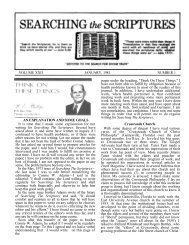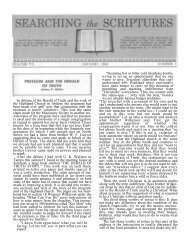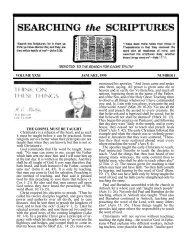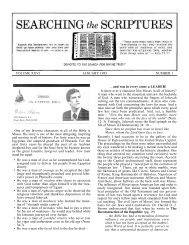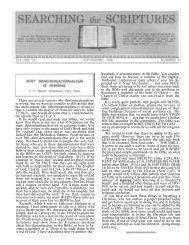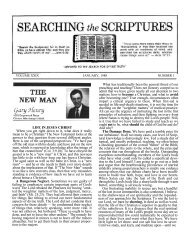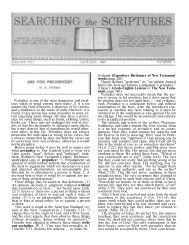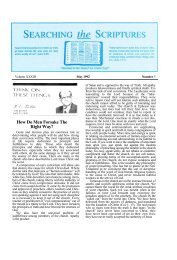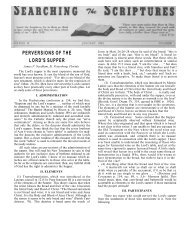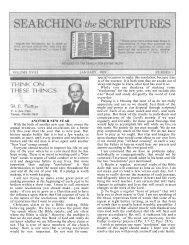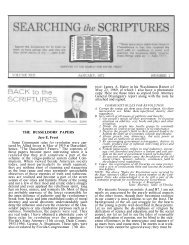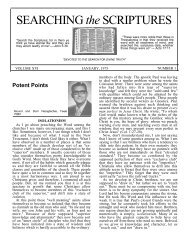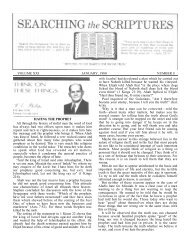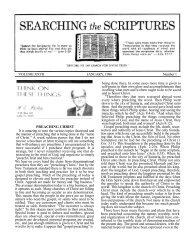In Ephesians 5:22-33, Paul drew an analogy between the ...
In Ephesians 5:22-33, Paul drew an analogy between the ...
In Ephesians 5:22-33, Paul drew an analogy between the ...
Create successful ePaper yourself
Turn your PDF publications into a flip-book with our unique Google optimized e-Paper software.
___________________________________________________________________________________________________ Page 11<br />
<strong>Ephesi<strong>an</strong>s</strong> 2:1-10<br />
These verses set before us one of <strong>the</strong> most beautiful<br />
<strong>an</strong>d thrilling experiences possible for <strong>the</strong> soul of m<strong>an</strong>. It<br />
focuses attention upon <strong>the</strong> power <strong>an</strong>d <strong>the</strong> grace of God by<br />
which a tr<strong>an</strong>sition is wrought that involves <strong>the</strong> greatest<br />
possible contrast. It involves a resurrection from death<br />
in sin with all its consequences to life in Christ with all<br />
its exceeding great <strong>an</strong>d precious rewards. The efficacy<br />
<strong>an</strong>d magnificence of <strong>the</strong> power is clearly seen in that it<br />
lifts a soul from <strong>the</strong> deepest <strong>an</strong>d darkest dive of sin to<br />
heights that are brilli<strong>an</strong>tly bright with righteousness. It<br />
is <strong>the</strong> same power by which Jesus Christ was raised up<br />
from <strong>the</strong> dead <strong>an</strong>d seated at <strong>the</strong> right h<strong>an</strong>d of <strong>the</strong><br />
heavenly Fa<strong>the</strong>r (Eph. 1:19,20). The beauty of <strong>the</strong> whole<br />
tr<strong>an</strong>sition is seen in <strong>the</strong> grace of God which is <strong>the</strong><br />
underlying <strong>an</strong>d motivating force throughout <strong>the</strong> whole<br />
experience.<br />
Our text very naturally divides itself threefold: 1) A<br />
State of Spiritual Death, 2) A Spiritual Resurrection,<br />
<strong>an</strong>d 3) A Spiritual Objective.<br />
A State of Spiritual Death<br />
The spiritual resurrection, which is <strong>the</strong> heart of this<br />
<strong>the</strong>me, is prefaced with a clear cut view of those involved<br />
prior to <strong>the</strong>ir resurrection. They were "quickened)<br />
("Made alive" — W. E. Vine) from being "dead in trespasses<br />
<strong>an</strong>d sins" (v. 1). They were in a state of spiritual<br />
death which involves separation from God (Cf. Gen.<br />
2:17; Isa. 59:1,2;Jno. 5:24,25; 1 Tim. 5:6;Lk. 15:32). The<br />
pronouns "you" (v. 1) <strong>an</strong>d "we" (v. 3) show conclusively<br />
that both Jew <strong>an</strong>d Gentile were equally guilty before<br />
<strong>the</strong>ir spiritual resurrection. The expression "trespasses<br />
<strong>an</strong>d sins" simply refers to specific tr<strong>an</strong>sgressions <strong>an</strong>d<br />
those more general — it covers <strong>the</strong> whole realm of sin<br />
<strong>an</strong>d shows that <strong>an</strong>y sin — all sin — (whe<strong>the</strong>r by commission<br />
or omission) separates from God <strong>an</strong>d leaves one in<br />
a state of spiritual death.<br />
The gravity <strong>an</strong>d depth of <strong>the</strong>ir sin is clearly set forth<br />
in <strong>the</strong> following expressions:<br />
1) They "walked according to <strong>the</strong> course of this world"<br />
(v. 2). While <strong>the</strong> word "world" is used in different senses<br />
in <strong>the</strong> Scriptures, I think it refers in this inst<strong>an</strong>ce to<br />
people in general who are alienated from God (Cf. 1 Cor.<br />
2: 6,12; 3:18,19). Their m<strong>an</strong>ner of life was in harmony<br />
with <strong>the</strong>ir present environment — a people without<br />
knowledge of God.<br />
2) "According to <strong>the</strong> prince of <strong>the</strong> power of <strong>the</strong> air" (v.<br />
2). This obviously refers to <strong>the</strong> devil. Elsewhere he is<br />
called "<strong>the</strong> prince of <strong>the</strong> devils" (Matt. 9: 34,12:24; Mk.<br />
3:<strong>22</strong>); "<strong>the</strong> prince of this world (John 12:31; 14:30; 16:11).<br />
These people were formerly under <strong>the</strong> control of Sat<strong>an</strong>.<br />
3) "According to ... <strong>the</strong> spirit that now worketh in <strong>the</strong><br />
children of disobedience: (v. 2). This spirit is without<br />
respect for duly constituted authority. Such is some-<br />
times seen in a child who ignores <strong>an</strong>d rebels against <strong>the</strong><br />
rules of parents. This spirit of disobedience has wrought<br />
havoc in m<strong>an</strong>y homes—resulting in sorrow, shame, <strong>an</strong>d<br />
untold suffering. If not corrected early in <strong>the</strong> home, it<br />
will magnify itself in rebellion to civil authority, <strong>an</strong>d,<br />
certainly, it will show no reverence for divine authority.<br />
Jews <strong>an</strong>d Gentiles of <strong>the</strong> Ephesi<strong>an</strong> church were guilty of<br />
this spirit in <strong>the</strong>ir former life. Unfortunately, that spirit<br />
is too much in evidence today.<br />
4) "The lust of our flesh" is that in which <strong>the</strong>y had <strong>the</strong>ir<br />
"conversation" or m<strong>an</strong>ner of life in times past (v.3).<br />
While <strong>the</strong> word from which "lust" is tr<strong>an</strong>slated is some-<br />
times used to indicate a strong desire for that which is<br />
good, it most often denotes <strong>an</strong> "inordinate desire" for<br />
that which is evil. The word "inordinate" is defined by<br />
Webster to me<strong>an</strong>: "Not ordered or kept within bounds;<br />
unregulated; unrestrained."<br />
God intends for m<strong>an</strong> to be <strong>the</strong> master of his physical<br />
desires (1 Cor. 9:27). He has provided for <strong>the</strong> legitimate<br />
fulfillment of every desire in m<strong>an</strong>. However, when <strong>the</strong>se<br />
desires become so strong that God's order is ignored <strong>an</strong>d<br />
fulfillment is sought o<strong>the</strong>rwise, lust becomes <strong>the</strong> master<br />
<strong>an</strong>d leads one into sin (Jas. 1:14,15). Peter refers to such<br />
as having become "serv<strong>an</strong>ts ("in bondage"—W. E. Vine)<br />
of corruption"(2Pet. 2:19). Such was <strong>the</strong> way of life of<br />
<strong>the</strong> <strong>Ephesi<strong>an</strong>s</strong> in <strong>the</strong> past.<br />
5) "By nature <strong>the</strong> children of wrath." Unfortunately,<br />
this expression has been misunderstood <strong>an</strong>d misused so<br />
as to teach false doctrine. Calvinists use it to teach<br />
"Hereditary Total Depravity" — that sin is inherent in<br />
one's nature — that one is born in sin. However, <strong>the</strong><br />
Greek word tr<strong>an</strong>slated "nature" is sometimes used to<br />
describe that which has become a habit with <strong>an</strong> individ-<br />
ual — something that has developed over a period of<br />
time. We sometimes refer to such as a person's "second<br />
nature." It is <strong>the</strong> nature of some to curse, but <strong>the</strong>y were<br />
not born that way. Such developed through practice<br />
until it became a habit, <strong>an</strong>d that is how it came to be a<br />
part of <strong>the</strong>ir nature. So it was with those of our text. They<br />
were by nature (habit) <strong>the</strong> children of wrath — <strong>the</strong><br />
objects of God's wrath. Since <strong>Paul</strong> has already described<br />
a series of evil practices on <strong>the</strong>ir part, <strong>the</strong> context <strong>an</strong>d all<br />
else revealed dem<strong>an</strong>d that this me<strong>an</strong>ing be given to <strong>the</strong><br />
word "nature" in this inst<strong>an</strong>ce.<br />
A Spiritual Resurrection<br />
This part of our text begins with <strong>the</strong> contrasting<br />
conjunction "But" (v. 4). This reverses <strong>the</strong> former picture<br />
of <strong>the</strong> <strong>Ephesi<strong>an</strong>s</strong> <strong>an</strong>d gives us a view of <strong>the</strong>m in <strong>the</strong><br />
highest position possible for one to occupy during his<br />
journey through time. It is called "heavenly places in<br />
Christ Jesus" (v. 6). While <strong>the</strong> word "places" or "things"<br />
(marginal reading) is elliptical in <strong>the</strong> original text, such<br />
is well supplied by our tr<strong>an</strong>slators. The me<strong>an</strong>ing is that<br />
<strong>the</strong>se souls have been "raised up" to a position that<br />
relates <strong>the</strong>m to heaven (Cf. Eph. 1:3, 20; 3:10). It is a<br />
spiritual relationship that identifies <strong>the</strong>m with Christ



